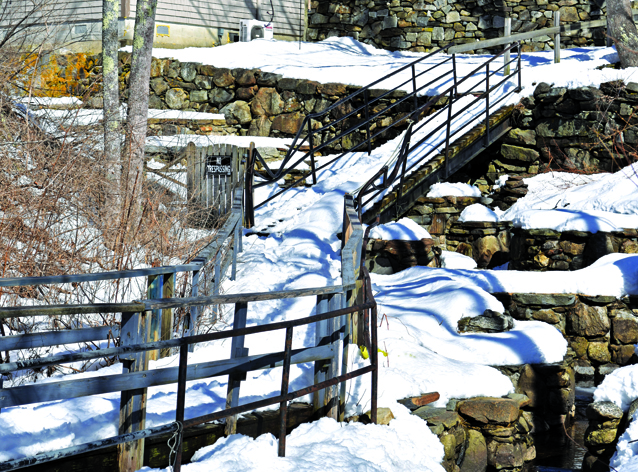
The nearly 70-year-old footbridge at the Damariscotta Mills Fish Ladder is now unsafe for large crowds, leading to another year without an Alewife Festival. The fish ladder restoration committee is reviewing contractors and pursuing grants to replace the bridge in August. (Elizabeth Walztoni photo)
For the fourth year in a row, there will be no Alewife Festival held at the Damariscotta Mills fish ladder in May — this time, because of the deteriorating 70-year-old footbridge over the ladder.
Laurel Ames and Bob Barkalow, of the Damariscotta Mills Fish Ladder Restoration Committee, visited the Newcastle and Nobleboro select boards last week to provide updates on bridge replacement. Barkalow said the bridge is one of the larger projects remaining on the list of fish ladder repairs since the major reconstruction completed in 2014.
The ladder was built by the towns of Newcastle and Nobleboro in 1807 to allow alewives passage from the Great Salt Bay to their spawning grounds in Damariscotta Lake and for the towns to harvest them.
Reconstruction began in 2007 through the restoration committee, an organization independent from both towns.
The first Alewife Festival fundraiser was held that year and continued until 2020, when it was canceled due to the pandemic.
According to Ames, an engineer inspected the bridge and would not sign off on its safety for a festival ground last year. She said it can still hold casual foot traffic.
The bridge is a route out of the festival area, according to Barkalow, posing another safety concern.
The restoration committee has been at work on replacement plans since the spring of 2022. Engineering analysis is finished, designs have been drawn, and permits are in place, according to Ames. The Maine Department of Marine Resources approved a water shutoff for August to allow construction.
The replacement bridge will be made of wood, rather than steel.
Ames said wood construction makes it easier to find workers and complete repairs. According to Ames, treated wood has the same lifespan as modern steel.
One remaining task is to find a contractor to remove and replace the bridge, along with an upper walkway, late this summer.
The upper walkway will likely be removed so a pre-constructed bridge can be carried in via Ladd’s Hill. Repairs will also be done on the fish pools when the water is drained.
The project will be funded jointly by the committee and the two towns. Town contributions come from a reserve account of the profits from previous alewife harvests.
Ames plans to apply for grants of up to $15,000 from both the Horizon Foundation and the Stephen and Tabitha King Foundation to reduce the project cost, which engineers estimated between $30,000 and $100,000.
A budget is required to submit a grant application, and the two towns are working to receive contractor proposals in the next two weeks to meet grant deadlines. The committee has identified one option and the Nobleboro Select Board suggested another.
Nobleboro Select Board member Richard Powell said that once prices come in, the towns of Nobleboro and Newcastle will meet about the project. He said Newcastle’s attorney had determined that a project did not have to go out to bid if it is not done by the town and for the town.
Powell asked whether the festival could return in 2024 if work is completed this year.
“That’s a maybe,” Barkalow said.
He said the festival needs energy and help; he suggested a festival return was possible if volunteers got involved.
Barkalow said future programming could go in several directions. Offering a half-marathon race is a possibility, and has received support from the Damariscotta Region Chamber of Commerce and Information Bureau, he said.
Live music offerings could also be expanded from the current benefit concerts at the Lincoln Theater in Damariscotta.
Ames said the festival could be split into two days to reduce traffic.
The 5K race continued last year and will be held again in 2023, along with a concert and a quilt raffle; a similar schedule is planned for this summer, according to Barkalow.
Barkalow said that, even without the festival, last summer’s festivities raised $2,700 after expenses, a similar figure to festival years.
This year’s Run with the Alewives race is scheduled for Sunday, May 28.






